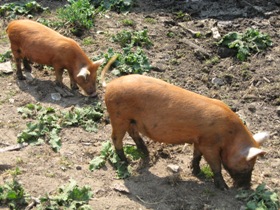Chinese farmers still feed pigs banned products

Many Chinese farmers continue to feed banned chemicals to their pigs. By doing so they increase the risk of disease and illness in humans, according to a report from the nation’s top legislature.
Weak links in the government’s management of farming and safety standards have led to an increasing number of cases of people becoming sick from contaminated pork, according to the report released from the National People’s Congress Agriculture and Rural Affairs Committee.
The Ministry of Agriculture has launched a year-long crackdown on the supervision of the production, marketing and abuse of additives, but the NPC’s report puts added pressure on the campaign to wipe out the practice.©
Clenbuterol
“There is still illegal use of Clenbuterol and other banned chemicals,” said Wang Yunlong, chairman of the NPC’s Agriculture and Rural Affairs Committee.©
This year, the ministry has exposed 8,677 cases of additive abuse, halted 124 enterprises without operating permits and cancelled 87 licensed enterprises in China.©
Clenbuterol, dubbed “shouroujing,” is added to the pig feed to keep the animals lean. Leaner pork brings a higher price, especially as the market for pork in China has dropped sharply.
The additive is harmful to humans and can be fatal since it often accumulates in organs such as the liver and lungs.
The ministry declined to provide the latest statistics on how many cases of banned drugs or additives in pig farming have been exposed so far this year.
Pork is too cheap
Money is at the root of the problem and in some places, the price of pork is lower than that of vegetables. To keep up with the cost, farmers seek any means.
The use of banned chemicals is a crime, but the practice comes from “a lack of protection for the farmers’ interests and farmers were no held responsible,” an insider said.
The farmers may be buying the additives from fertilizer and feed providers, experts said.











